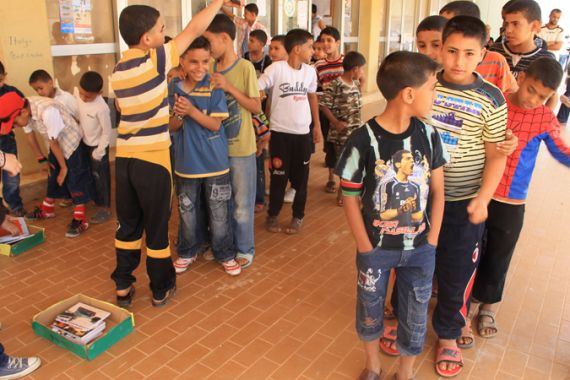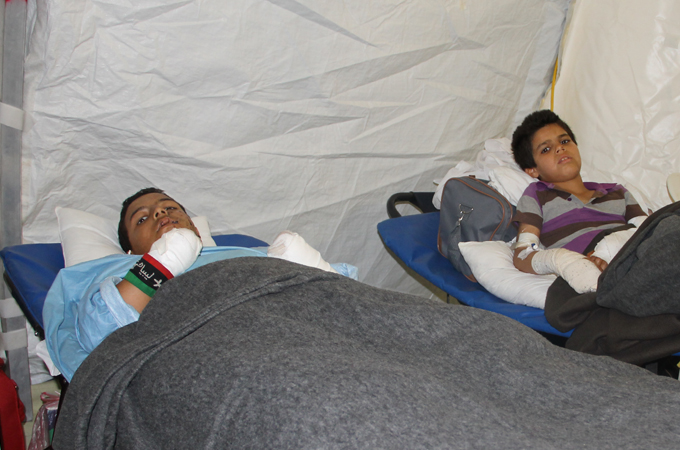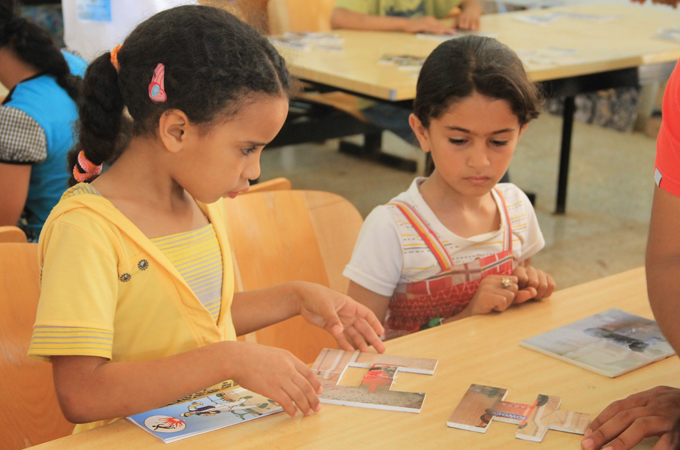Libyan kids maimed by war remnants
UNICEF workshops in Libya help to educate about the dangers of “explosive remnants of war” that remain deadly.

 |
| After mistaking explosive remnants of war as shrapnel in Misurata, an undetonated cluster bomb exploded in Ayman’s hands – injured, him and his friend were evacuated to Benghazi for medical treatment [UNICEF/Rebecca Fordham] |
On May 31, 2011, UNICEF Communication Specialist Rebecca Fordham boarded the relief boat carrying two boys injured from explosive remnants of the war in Libya. She also participated in workshops to raise awareness and protect children from these horrific weapons of war in the conflict-affected eastern Libya. This is her first-hand account.
I witnessed the graphic impact of conflict on children when I boarded a boat coming into Benghazi from Misurata. Two young boys, who had been severely injured by explosive remnants of war (ERW), lay on beds inside the onboard field hospital, provided by LibAid, with their fathers standing patiently beside them.
Both boys stared out, Ayman, 14, his wrists heavily bandaged and, Mahmud, 9, lying quietly in the bed next to him. The boys had been playing close to the Medical Technical College in Misurata, Ayman’s father told me, when his son picked up what he thought was shrapnel from an exploded bomb to take home and show his family. It exploded when he touched it.
His father knew there were “cluster bombs” that had been dropped close by, and that they could explode when someone tried to move them, but he didn’t know the exact location and what they looked like.
Children are particularly at risk, because their natural curiosity means they often pick up items that adults are more cautious to touch. In Libya, they need to understand the dangers of unexploded ordinance and also have safe spaces for their children to play in, even though many of them have been living under extremely challenging and stressful conditions for over three months.
 |
| Two young girls putting together puzzles as part of a UNICEF-supported workshop aimed at raising awareness of unexploded remnants of war in a Benghazi camp [UNICEF/Rebecca Fordham] |
Throughout the last couple of weeks I have been visiting educational awareness workshops, which are led by trained community members with technical guidance and support from UNICEF and its partners. The objective is to develop children’s and their families’ understanding of ERW.
Abdel Rahim El Fitouri, the Chief of the Libyan Scouts, told me, “We want to help our community. The aim is not to frighten people but to create awareness before they return to their towns and to show the dangers by preparing children and their families.”
The workshops are taking place at Internally Displaced Person (IDP) camps across Benghazi and will be developed in Misurata and other conflict affected areas as the security situation allows. One workshop I visited was attended by 332 children, the majority of whose families had come from Brega and Ajdabiya to escape the fighting.
The children were totally absorbed by the activities. They studied memory cards and meticulously copied pictures of ERW with colouring pencils. One boy, Diran, from Ajdabiya, told me he liked making new friends at the workshop, and the memory games helped him to think about what to look out for.
Explosive remnants
We are aware that the problem lies mainly in the areas around Ajdabiya, Brega and Misurata, which are still experiencing conflict. The next challenge will be to accompany back to their homes the children who have benefited from the workshop training to ensure they remember what they have learned and be peer counsellors for their friends back home.
The ERW threat in Misurata is particularly grave. Limited surveys of Misurata confirm the use of cluster munitions and anti-personnel mines amongst a litany of ERW across the city. It has been reported that 30 Ammunition Storage Areas have been destroyed by airstrikes, spreading even more ERW. According to ICRC, in the past 6 weeks there have been 13 reported casualties from ERW in Misurata.
Small arms and munitions are also a widespread concern across Benghazi. Katibas, an Arabic word for a large store of weapons – located within Libya’s city limits – were opened up during the conflict and became accessible to the local community. As a result, there are reports of civilians collecting the ERW as scrap metal. These are now being secured by the international mine action community in coordination with local partners.
I visited, Fatima, an eight year old girl, at her grandparents’ home in Al-Rajma, eastern Benghazi. She was injured when a local katiba exploded near to where her family was enjoying a day out. Her father had died from the blast. The katiba and surrounding area has now been closed off but Fatima says she didn’t know it was dangerous.
UN agencies, NGOs and local partners have joined to form the Joint Mine Action Coordinated Team (JMACT) to work with mine action actors on the ground, prioritising clearance tasks and working to ensure targeted information is integrated into the programme response and delivered to affected communities as the security situation allows.
Handicap International, UNICEF’s implementing partner, is providing leaflets and posters to the communities at risk in Misurata, and messages have been provided to radio stations to encourage safe behaviour.
In addition, a UN mission is travelling to Misurata this week, which will provide much needed information and further develop awareness of the situation.
There have also been successful advocacy efforts to prevent parties to the conflict using these deadly weapons. On March 28, the rebels issued a communique not to use anti-personnel and anti-vehicle weapons. Massive campaigns are underway with community leaders, school masters and religious leaders to further protect civilians.
Both Ayman and Mahmud were taken to a Misurata hospital where Ayman had to have both his hands amputated. They are now receiving medical treatment in Benghazi. I have visited the hospital and hope to again soon.